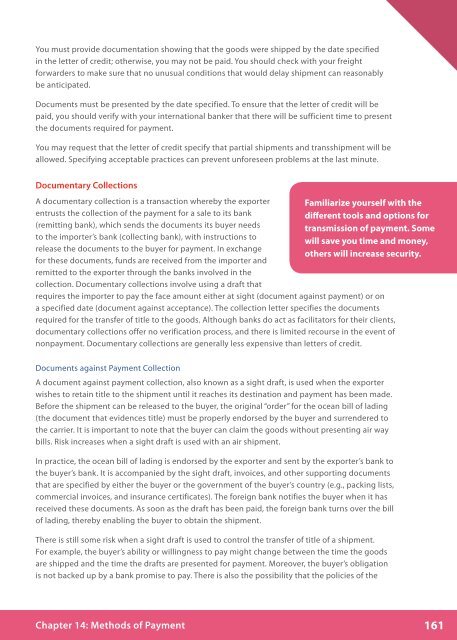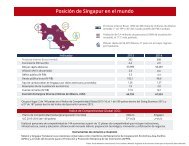basic-guide-to-exporting_Latest_eg_main_086196
basic-guide-to-exporting_Latest_eg_main_086196
basic-guide-to-exporting_Latest_eg_main_086196
Create successful ePaper yourself
Turn your PDF publications into a flip-book with our unique Google optimized e-Paper software.
You must provide documentation showing that the goods were shipped by the date specifiedin the letter of credit; otherwise, you may not be paid. You should check with your freightforwarders <strong>to</strong> make sure that no unusual conditions that would delay shipment can reasonablybe anticipated.Documents must be presented by the date specified. To ensure that the letter of credit will bepaid, you should verify with your international banker that there will be sufficient time <strong>to</strong> presentthe documents required for payment.You may request that the letter of credit specify that partial shipments and transshipment will beallowed. Specifying acceptable practices can prevent unforeseen problems at the last minute.Documentary CollectionsA documentary collection is a transaction whereby the exporter Familiarize yourself with theentrusts the collection of the payment for a sale <strong>to</strong> its bankdifferent <strong>to</strong>ols and options for(remitting bank), which sends the documents its buyer needstransmission of payment. Some<strong>to</strong> the importer’s bank (collecting bank), with instructions <strong>to</strong>will save you time and money,release the documents <strong>to</strong> the buyer for payment. In exchangeothers will increase security.for these documents, funds are received from the importer andremitted <strong>to</strong> the exporter through the banks involved in thecollection. Documentary collections involve using a draft thatrequires the importer <strong>to</strong> pay the face amount either at sight (document against payment) or ona specified date (document against acceptance). The collection letter specifies the documentsrequired for the transfer of title <strong>to</strong> the goods. Although banks do act as facilita<strong>to</strong>rs for their clients,documentary collections offer no verification process, and there is limited recourse in the event ofnonpayment. Documentary collections are generally less expensive than letters of credit.Documents against Payment CollectionA document against payment collection, also known as a sight draft, is used when the exporterwishes <strong>to</strong> retain title <strong>to</strong> the shipment until it reaches its destination and payment has been made.Before the shipment can be released <strong>to</strong> the buyer, the original “order” for the ocean bill of lading(the document that evidences title) must be properly endorsed by the buyer and surrendered <strong>to</strong>the carrier. It is important <strong>to</strong> note that the buyer can claim the goods without presenting air waybills. Risk increases when a sight draft is used with an air shipment.In practice, the ocean bill of lading is endorsed by the exporter and sent by the exporter’s bank <strong>to</strong>the buyer’s bank. It is accompanied by the sight draft, invoices, and other supporting documentsthat are specified by either the buyer or the government of the buyer’s country (e.g., packing lists,commercial invoices, and insurance certificates). The foreign bank notifies the buyer when it hasreceived these documents. As soon as the draft has been paid, the foreign bank turns over the billof lading, thereby enabling the buyer <strong>to</strong> obtain the shipment.There is still some risk when a sight draft is used <strong>to</strong> control the transfer of title of a shipment.For example, the buyer’s ability or willingness <strong>to</strong> pay might change between the time the goodsare shipped and the time the drafts are presented for payment. Moreover, the buyer’s obligationis not backed up by a bank promise <strong>to</strong> pay. There is also the possibility that the policies of theChapter 14: Methods of Payment161





